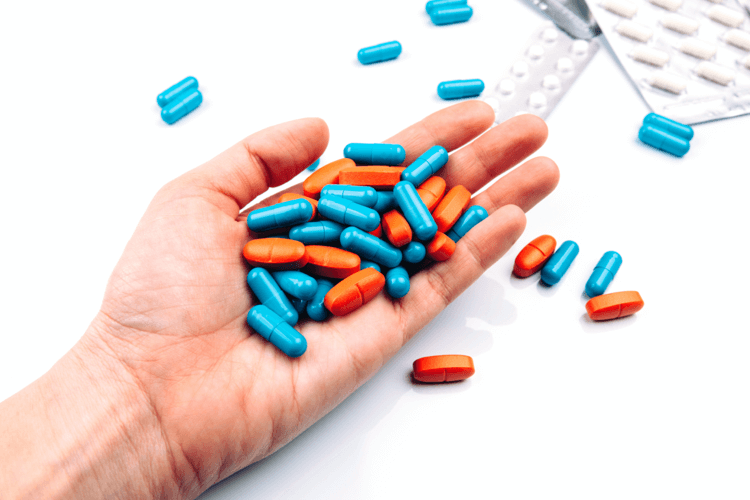Oral Medications to Treat Type 2 Diabetes

Type 2 diabetes is a complex condition characterized by insufficient insulin or the inability to respond to insulin efficiently (insulin resistance), and an increased rate of liver glucose production. Some people who have type 2 diabetes can achieve their blood sugar target levels with diet and exercise alone, but many also need diabetes medications or insulin therapy.
There are many different types of medicines that work in different ways to help control your blood sugar, here we look at some of the most common.
It should be noted that lifestyle modifications including diet and exercise are always a part of diabetes treatment.
Metformin/biguanides
Metformin is a first line drug for treating people with type 2 diabetes along with lifestyle modifications, which include diet and exercise. Metformin is taken once or twice a day with meals. Metformin helps to prevent the liver from producing excess glucose from glycogen stores, it also helps increase the body’s response to insulin, increasing insulin sensitivity. This medication is associated with modest weight loss which is a bonus for many people with diabetes. A side effect of metformin may be nausea or diarrhea, but this often improves over time or if the medication is taken with food.
Sulfonylureas
Sulfonylureas have been in use to treat type 2 diabetes since the 1950s. They work by stimulating the pancreas to produce more insulin. Sulfonylureas include glyburide, glipizide, and glimepiride. These medications are generally taken once or twice a day 30 minutes before food. Possible side effects include low blood sugar and weight gain.
TZD’s (Thiazolidinediones)
TZD’s increase insulin sensitivity. They help insulin work better in the muscle and fat and reduce glucose production in the liver. These medications aren’t generally first-line treatments because they may cause side effects such as weight gain, anemia and an increased risk of heart failure.
DPP-4 Inhibitors
These medications have proven themselves as good additions to existing drugs when blood sugars start to rise in type 2 diabetes. Combined with other drugs, they can have a stabilizing effect on blood sugars. They also don’t cause weight gain. Side effects include joint pain and a possible risk of pancreatitis.
SGLT-2 Inhibitors
Glucose in your bloodstream passes through the kidneys where it can be reabsorbed or excreted in your urine. Sodium-glucose transporter 2 (SGLT-2) works with the kidney to reabsorb glucose. SGLT-2 inhibitors block this action and cause excess glucose to be removed in the urine. Side effects may include yeast infections, urinary tract infections and low blood pressure. Medicines in this group may reduce the risk of heart attack and stroke in people at high risk of these conditions.
Meglitinides
These drugs stimulate insulin production at mealtime to help with blood sugar surges. They work in a similar way to the sulfonylureas. These medicines are generally dosed before meals (three times a day). They may cause low blood sugar and weight gain.
Alpha-Glucosidase Inhibitors-acarbose
These medicines block the absorption of carbohydrates by impeding the breakdown of carbs into sugars. This slows glucose absorption and may help avoiding post-meal blood sugar spikes. They are taken right before eating a meal.
<b>Medical Disclaimer</b>
The articles provided on this website are for informational purposes only. In addition, it is written for a generic audience and not a specific case; therefore, this information should not be used for diagnostic or medical treatment. This site does not attempt to replace the patient-physician relationship and fully recommends the reader to seek out the best care from his/her physician and/or diabetes educator.
- Bath, P. Met al. “The Insulin Resistance Intervention after Stroke Trial: A Perspective on Future Practice and Research.” International Journal of Stroke (2016): n.pag. Web.
- http://www.pharm-alert.com/ms/glp1/article/glp1ras-resulted-in-best-t2d-glycemic-control?utm_content=microsite_link&utm_source=email&utm_medium=email&utm_campaign=glp1&uid=CCD4D9447ED2B3FD79486EDEDD0C49E0&wc_mid=4:573061&wc_rid=4:769851
- ZelnikerTA, et al. SGLT2 inhibitors for primary and secondary prevention of cardiovascular and renal outcomes in type 2 diabetes: a systematic review and meta-analysis of cardiovascular outcome trials. Lancet. 2019;393(10166):31–9.
DAR-0169 RevA







